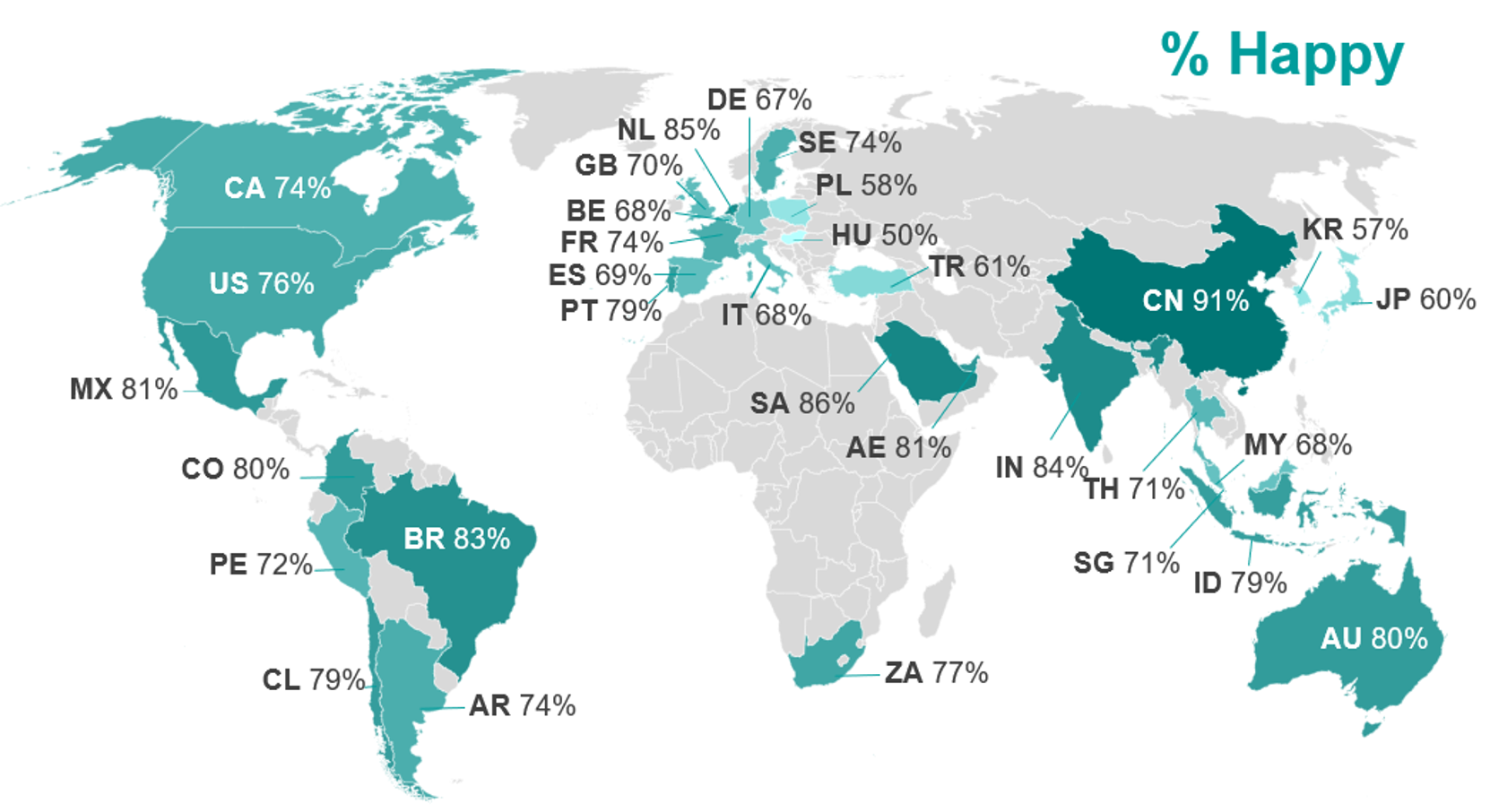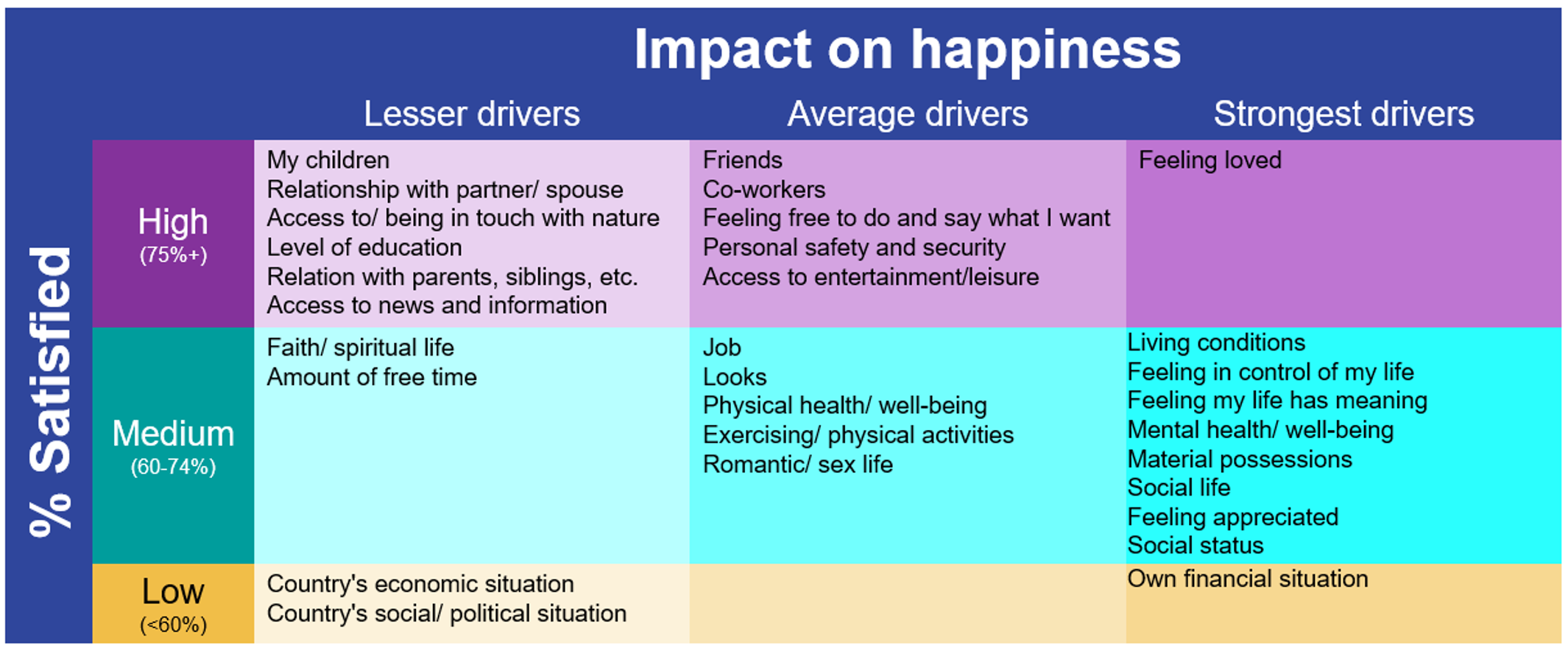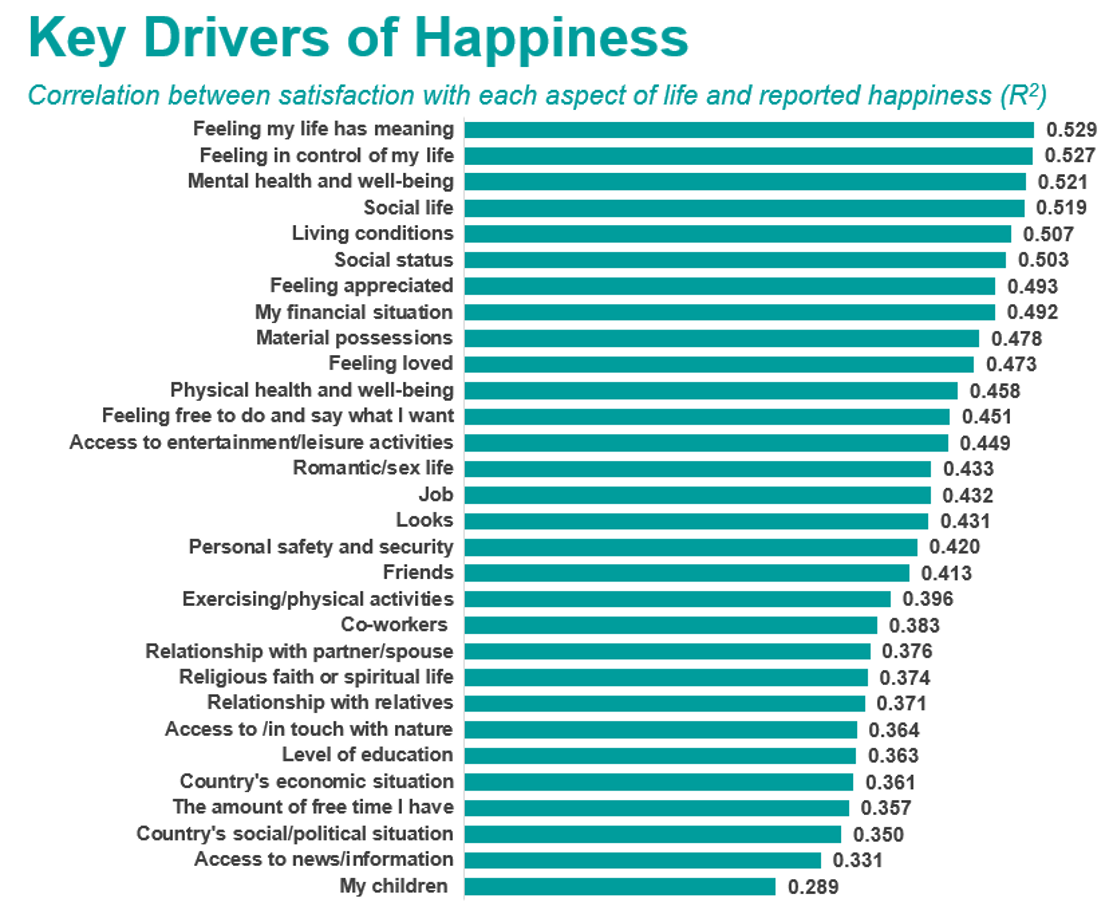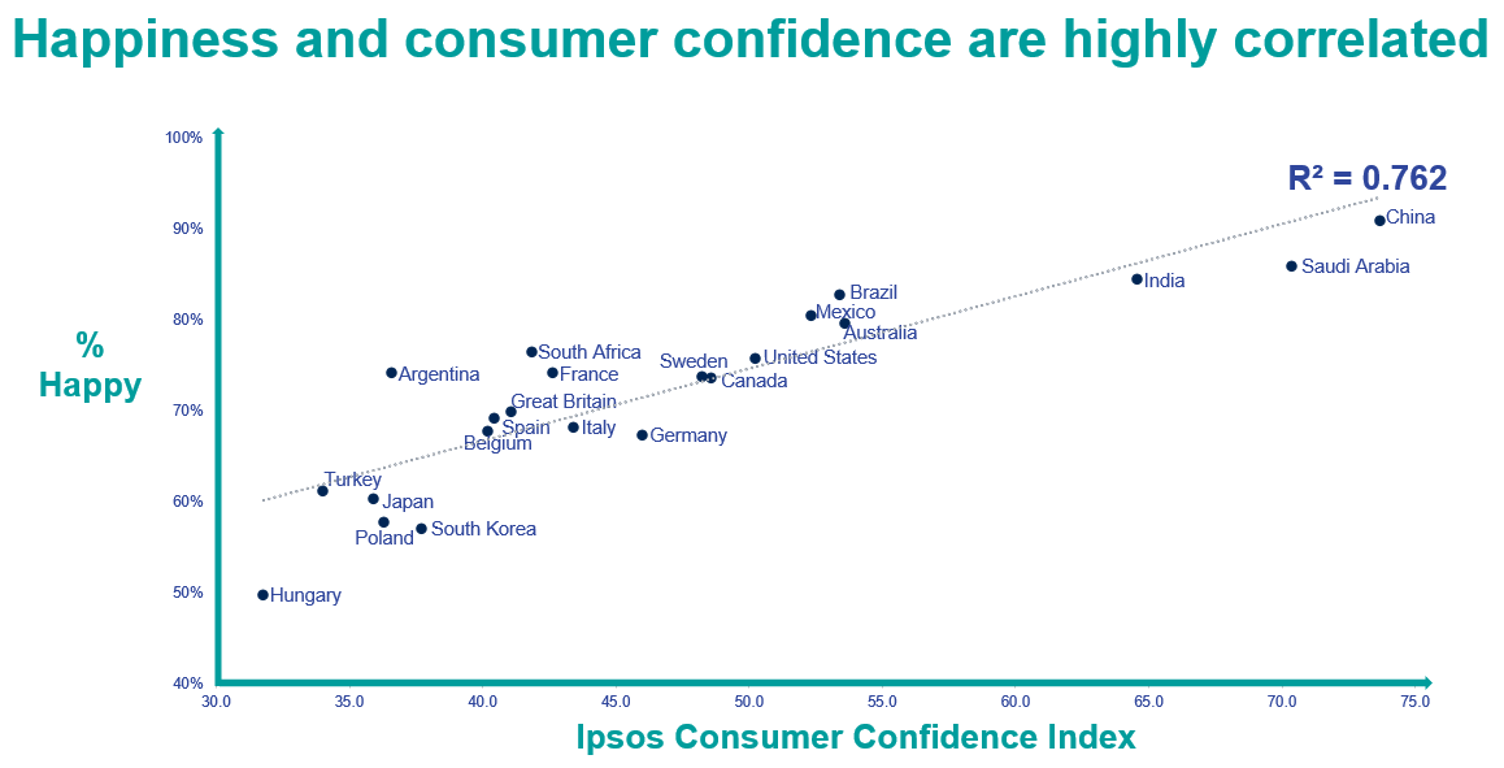Australians are less happy than they were in 2021
Australia was one of only seven countries in the survey to show a decrease since December 2021 in the proportion of people reporting they are happy.
Eight in 10 (80%) Australians are describing themselves as happy, however this is a fall from 85% in December 2021, according to Ipsos’s latest Global Happiness survey.On average globally, nearly three in four (73%) adults across 32 countries describe themselves as happy. Of all the countries surveyed, those with the highest proportions of happy citizens are China (91%), Saudi Arabia (86%), and the Netherlands (85%).
Interestingly, analysis conducted on this year’s data shows that life satisfaction is roaring in Latin America but dropping in many Western countries; while people strive for social connections, many are pessimistic about the future of relationships and one in five globally say they have no one to turn to for support.

Interestingly, analysis conducted on this year’s data shows that life satisfaction is roaring in Latin America but dropping in many Western countries; while people strive for social connections, many are pessimistic about the future of relationships and one in five globally say they have no one to turn to for support.
Key Australian findings
- Fewer of us are describing ourselves as happy (80%) compared to when Ipsos last took this measure in December 2021 (85%).
- This decrease has seen Australia slide down the happiness list. In 2021, we were second only to the Netherlands (86%), whereas in this latest study we are sitting in 9th position.
- Ipsos also asked participants how satisfied they were with different aspects of their lives. In Australia the areas of life we are most satisfied with are:
- My child - among parents (87%);
- Relationship with partner/spouse
- among those who have one (87%);
- Level of education (87%);
- Personal safety and security (87%);
- Living conditions (86%); and
- Access to/in touch with nature (84%).
- When we look at the global ranking of satisfaction with these aspects versus in Australia, the survey shows that we are much lower on access to/in touch with nature (ranked 3rd globally vs 6th in Australia), and friends (6th globally vs 9th Australia), but are much higher on personal safety and security (11th vs 4th) and living conditions (15th vs 5th).
- Australians are one of the least likely among countries surveyed to report having ‘recently experienced a deeply disturbing or distressing event that has prevented me from feeling good about my life’ (27%), alongside Great Britain (27%) and Portugal (24%). The global average on this measure is 39% with UAE (59%) and Saudi Arabia (58%) topping the list.
- Australia is also one of the lowest to report ‘facing or recently faced a difficult personal situation that I could not resolve by myself’ (29% vs the global average of 56%). On this measure we are again alongside Great Britain (27%) and closely followed by China (28%), with Portugal (22%) and Hungary (21%) anchoring the list.
Ipsos Australia Director, David Elliott, said: “Each time we conduct this survey, Australia sits towards the top of the list in terms of happiness. That we have fallen five points and seven places is perhaps not hugely surprising. While cost of living and inflation is a global issue, rather than a local issue, it is perhaps being more acutely felt in Australia. Other Ipsos data shows how we are feeling the pinch and its impact on our outlook.“Ipsos Global Trends 2023 shows Australians were second only to South Africa in predicting rising interest rates in 2023. With eight consecutive interest rate increases by the Reserve Bank throughout 2022, we were rightly concerned about further increases as the RBA has already raised rates twice in 2023."
“The growing strain on household budgets was acutely evident in our Ipsos Issues Monitor. Following the February rate rise, cost of living is now identified as the issue of greatest concern by 63% of Australians, five points higher than last month and now setting a new highpoint in concern for any issue since the Ipsos Issues Monitor began in 2010,” he said.
“Taking a long term view the fall of five points is significant. We’ve only seen it drop below 80% twice in the eight times we have measured happiness since 2011 - once in 2017 and once in 2020, the latter being very much driven by the impact of the COVID-19 pandemic.”
Key Global findings
Global happiness has increased for the second year in a row. It is six points higher than a year ago and 10 points higher than it was in August 2020, just months after COVID disrupted people’s lives around the world. The overall increase masks very different trends across regions: while the proportion of self-reported happy people has risen sharply across Latin America, it has taken a tumble in many Western countries. Year-over-year changes range from 26-point gains in Colombia and Argentina to a 13-point dip in Great Britain.
On average, happiness in middle-income countries (as defined by the World Bank) saw a more pronounced increase than it did in high-income countries. The average happiness level of middle-income countries has surpassed that of high-income countries for the first time since Ipsos started tracking them in 2011.
Among all the aspects of their lives, people tend to be most satisfied with their relationships — with their children, spouse, relatives, friends, co-workers, and with nature— and with knowledge-related areas such as their level of education and their access to information. On average globally, people tend to be least satisfied with the economic, political, or social situation of their country, their own finances, their romantic or sex life, and their physical activity.
However, the survey finds that people are most likely to say they are happy if they are satisfied that their life is meaningful, if they feel in control of their life, if they feel valued, and/or if they are satisfied with their mental and material well-being. The drivers of happiness vary little by gender, with the notable exceptions of marital relationships and mental health (more important to women's happiness) and of one’s own financial situation (more important to men's happiness).

The study reveals that many people lack a support system. Globally, only 72% have friends or relatives they could turn to for help, including less than two-thirds in in Japan, Brazil, and South Korea, and generally among those with a lower income. Four in 10 say they have recently experienced a distressing event with higher proportions among Gen Zers and Millennials, those with a lower income, and women.
Furthermore, while large majorities in nearly every country surveyed say they are happy, pessimism about the future of relationships prevails. Twice as many say it will become harder than say it will become easier for singles to find a romantic partner, for couples to maintain a happy relationship, and for people to have close friendships they can count on. Pessimism is particularly pronounced among Boomers and Gen Xers, the less educated and less affluent, unmarried adults, and more generally among citizens of high-income countries.
These are some of the findings of a survey of 22,508 adults between the ages of 18-74 conducted between December 22, 2022, and January 6, 2023, on Ipsos’s Global Advisor online survey platform.
Detailed Findings
Who and where are people the happiest?
On average across the 32 countries polled, 73% say they are very or rather happy. Among those countries, respondents from China (91%), Saudi Arabia (86%), the Netherlands (85%), India (84%), and Brazil (83%) report the highest level of happiness, while respondents from Hungary (50%), South Korea (57%) and Poland (58%) report the lowest. The U.S. hovers around the middle of the pack, with 76% of American respondents saying they are very or rather happy.
This year’s increase in the global level of happiness is driven by Latin American countries, many of which show remarkable year-over-year increases, including Colombia (+26 percentage points), Argentina (+26), Brazil (+20), and Peru (+18). Conversely, many Western countries posted declines in year-over-year reported happiness: Great Britain (-13 percentage points), Poland (-7), Canada (-6), Belgium (-5), Germany (-5), and former happiness champion Australia (-5).
Among 30 aspects of life, five of the top six showing the highest levels of satisfaction pertain to relationships:
- My children (if a parent) (85%)
- Relationship with partner/spouse (if has one) (84%)
- Access to/in touch with nature (80%)
- Level of education (80%)
- Relationship with relatives (78%)
- Friends (78%)
The five aspects respondents are least likely to be satisfied with are:
- Country’s social and political situation (40%)
- Country’s economic situation (40%)
- Own financial situation (57%)
- Romantic/sex life (63%)
- Exercising/physical activities (65%)
The areas of life respondents are happy with tend to vary depending on their country’s level of economic development. Relative to other aspects of their life, citizens of higher-income countries tend to be satisfied with their personal safety and security, material possessions and living conditions more than are those of middle-income countries. The latter tend to be more satisfied with their religious life, physical health, and looks than are citizens from more affluent countries.
What makes people happy?
Ipsos measured the relationship between all respondents’ reported level of overall happiness and level of satisfaction with 30 aspects of life. This analysis helped rank order all 30 aspects of life measured in terms their relative impact on overall happiness. It brings to light that the top five drivers of happiness are, in order: feeling one’s life has meaning, feeling in control of it, mental health and well-being, social life, and living conditions.
Among all 30 aspects of life, satisfaction with one’s children has the lowest impact on happiness, reflecting that most parents are satisfied with their children even if they are unhappy about other things in their life.

Challenging circumstances and access to support networks
Though family and friends are among the most prevalent sources of happiness, one in five adults lack a support system of friends or family they can rely on during difficult situations – even as many report having experienced distressing events in the past year.
Globally, 72% on average say they have friends or relatives that they could rely on to help them in case of need. This leaves 21% of adults saying they don’t have friends or relatives to rely on. (The remaining 7% preferred not to answer.)
- Respondents from Japan (54%), Brazil (58%), and South Korea (61%) are the least likely to say they have these support networks, while those from the Netherlands (82%), Indonesia (79%), and Portugal (79%) are the most likely to report having them.
- Lower-income, less educated, unmarried, and Gen Z respondents are also less likely to say they have access to support networks compared to higher-income, more educated, married, and older respondents, respectively.
Despite an alarmingly high number of people globally without access to support networks, many report experiencing distressing events that may have been easier to navigate with support networks. On average, 39% of respondents globally say they recently experienced a disturbing or distressing event that prevented them from feeling good about their life, while 37% said they are currently or recently faced a difficult situation that they could not resolve by themselves.
- Gen Z, Millennial, and lower-income respondents are also far more likely to say they have gone through distressing events recently than older and wealthier respondents.
Many are pessimistic about the future of finding friends and romance
The results of this study underscore the importance of friends and family as a major area of satisfaction in people’s lives. But just as many lack these relationships, many also feel that it will become harder to find or maintain these relationships.
About twice as many people say it will get more difficult rather than easier for single people to find a romantic partner (43% vs. 22%), for people to find close friends (43% vs. 23%), and for married couples to maintain happy relationships (43% vs. 21%). This pessimism is most pronounced among Boomers and Gen X respondents, females, and respondents that are unmarried, have lower income, or are unemployed.
Consumer confidence as a measure of happiness
Another key finding from this study is that, at the country-level, levels of happiness tend to reflect levels of consumer sentiment. Ipsos compared the percentage of happy adults and Ipsos’s Consumer Confidence Index across the 22 countries where both were measured in the same survey and found they are highly correlated. The Consumer Confidence Index tracks people’s sentiment about their financial situation, their ability to make purchases and investments, and perceptions of their local economy, job security and future opportunities.

About the study
These are the findings of a 32-country Ipsos survey conducted December 22, 2022 – January 6, 2023, among 22,508 adults aged 18-74 in the United States, Canada, Malaysia, South Africa, and Turkey, 20-74 in Thailand, 21-74 in Indonesia and Singapore, and 16-74 in 24 other countries, via Ipsos’s Global Advisor online survey platform.
Each country’s sample consists of ca. 2,000 individuals in Japan; 1,000 individuals in each of Australia, Brazil, Canada, China (mainland), France, Germany, Great Britain, Italy, Spain, and the U.S.; and ca. 500 individuals in each of Argentina, Belgium, Chile, Colombia, Hungary, India, Indonesia, Malaysia, Mexico, the Netherlands, Peru, Poland, Portugal, Saudi Arabia, Singapore, South Africa, South Korea, Sweden, Thailand, Turkey, and the United Arab Emirates.
The samples in Argentina, Australia, Belgium, Canada, France, Germany, Great Britain, Hungary, Italy, Japan, the Netherlands, Poland, South Korea, Spain, Sweden, Switzerland, and the U.S. can be taken as representative of these countries’ general adult population under the age of 75.
The samples in Brazil, Chile, China, Colombia, India, Indonesia, Malaysia, Mexico, Peru, Saudi Arabia, Singapore, South Africa, Thailand, Turkey, and the UAE are more urban, more educated, and/or more affluent than the general population. The survey results for these markets should be viewed as reflecting the views of the more “connected” segment of their population.
Prior fieldwork waves were also conducted on Ipsos’s Global Advisor online survey platform:
- Nov 19 - Dec 3, 2021, among 20,504 adults in 30 countries
- Jul 24 - Aug 7, 2020, among 19,516 adults in 27 countries
- May 24 - Jun 7, 2019, among 20,327 adults in 28 countries
- Jan 26 - Feb 9, 2018, among 19,428 adults in 27 countries
- Feb 17 - Mar 3, 2017, among 18,523 adults in 26 countries
- May 7 - 21, 2013, among 18,513 adults in 25 countries
- Dec 6 - 19, 2011, among 21,245 adults in 24 countries
The data is weighted so that each market’s sample composition best reflects the demographic profile of the adult population according to the most recent census data.
The Global average reflects the average result of all the countries and markets where the survey was conducted that year. It has not been adjusted to the population size of each country or market and is not intended to suggest a total result.
Where results do not sum to 100 or the ‘difference’ appears to be +/-1 more/less than the actual, this may be due to rounding, multiple responses, or the exclusion of don't knows or not stated responses.
Sample surveys and polls may be subject to sources of error, including, but not limited to coverage error, and measurement error. The precision of the online surveys conducted is measured using a Bayesian Credibility Interval. Here, the Australian results have a credibility interval of +/-3.5 percentage points. For more information on the Ipsos use of credibility intervals, please go to ipsos.com/sites/default/files/2017-03/IpsosPA_CredibilityIntervals.pdf
As a foundation member of the Australian Polling Council, Ipsos complies with the Council’s Code of Conduct. The purpose of the Code is to provide journalists and the public with greater confidence and trust in publicly released polling and survey data. We strongly encourage the inclusion of methodological details in any reference to published Ipsos results.
This study is compliant with the Australian Polling Council Code of Conduct. The Long Methodology Disclosure Statement for the study will be available at ipsos.com/en-au/disclosure_statements within two business days.

